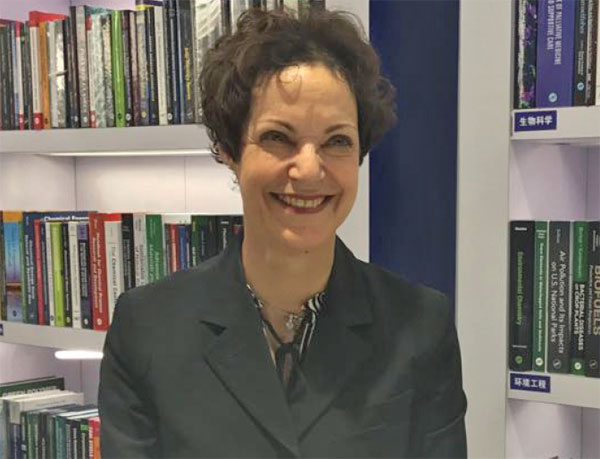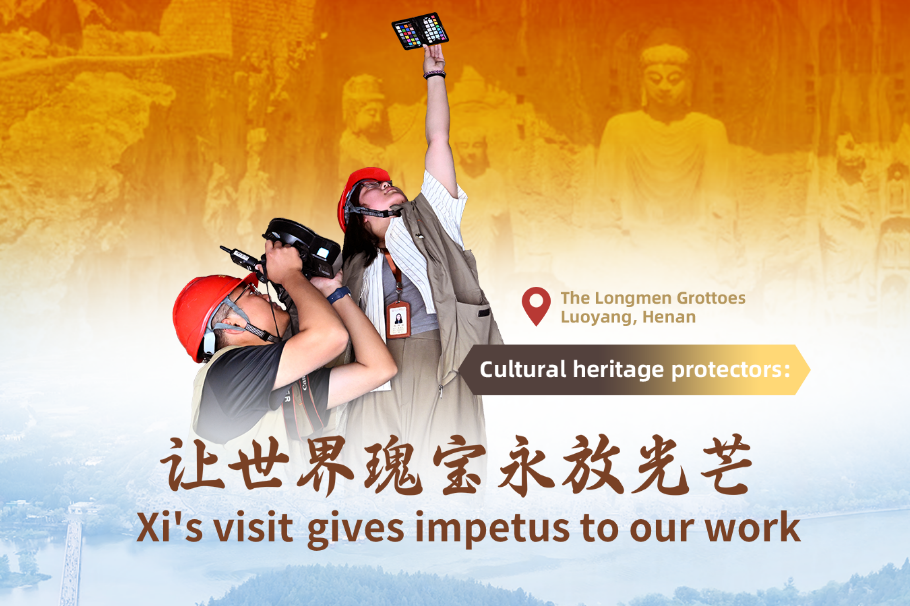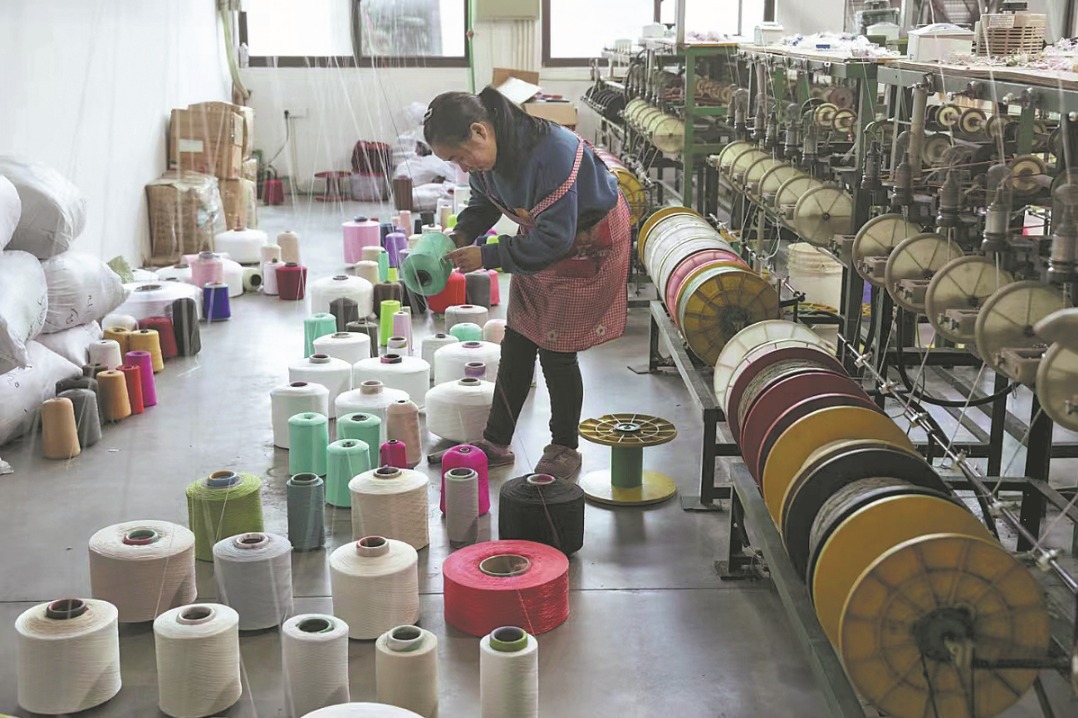A new chapter for publishing

Executive believes the digital age has potential to revolutionize academic books
Annie Callanan believes China's Belt and Road Initiative is not just about trade and infrastructure but about connecting the world in many different ways.
The newly appointed chief executive officer of UK academic publisher Taylor& Francis insists the initiative is just as relevant to an industry like publishing.
"The modern infrastructure today is technology. So yes, it can be about things such as building roads and airports but it can also be about technology infrastructure that connects countries," she says.
| Annie Callanan, the newly appointed chief executive officer of UK academic publisher Taylor& Francis, says she sees the Belt and Road Initiative as a way to break the barriers that prevent the transfer of knowledge across borders. Yan Dongjie / China Daily |
Callanan says she sees the Belt and Road breaking down the barriers that prevent the transfer of knowledge across borders.
"It is about fusing technology with knowledge and the learning process, to create frictionless communications and collaboration, particularly between the scholars of different countries," she says.
Callanan, who was appointed to her new position at the end of June, was speaking during the Beijing International Book Fair at the China International Exhibition Centre, now one of the flagship international publishing events, rivaling even Frankfurt.
"It is absolutely one of the key book fairs now. We are here to show our respect for our Chinese partners and for our colleagues that we work with, and to stand behind our brand in this market," she says.
It was also an opportunity for the 54-year-old American to meet up with some of her China-based staff for the first time.
The China office, which was set up as a representative office in 2005, now reports directly to the head office at Milton Park, Oxfordshire, and no longer to the Singapore Asia head office.
"That was an important reorganization. There is now a China-specific focus, as well as an Asia focus. My primary objective in coming here was really not to focus on participating in the book fair but to engage with my colleagues who represent us here on the ground and, equally important, to get to know some of the stakeholders."
She says China is a very important market for Taylor & Francis, the UK publisher which was founded in 1852 and is now part of Informa, the multinational events and media group. Its best-known imprint is Routledge.
"It is extraordinarily important. This is a growing hub of innovation, knowledge, wisdom and opportunity. And we are underserved in this market today. We have to embrace all the potential that exists here," she says.
Callanan is particularly keen to forge greater commercial links and partnerships in what is not only the largest publishing market in the world, after the US, but also where publishing began with the first printed book during the Tang Dynasty (618-907).

"We are looking at all the potential partnerships with the publishing community, aggregators, booksellers and other entities," she says.
Callanan has moved from New York, where she spent almost her entire career, to rural Oxfordshire in the United Kingdom to take up her new position.
"I am a New Yorker, but now my family and all our pets have moved. My family and I are passionate equestrians so we have brought our horses over. And we are in this spectacular countryside and loving it. It is very different from New York, for sure."
Publishing is also a new direction for Callanan, who has spent most of her career in the technology sector. She was previously chief executive officer of Quantros, a provider of digital solutions in the healthcare sector.
"Although it is my first publishing role, I have been in the ecosystem of publishing. For the past decade and a half I have been leading transformational organizations, leveraging technology to really pursue new value in new ways."
Callanan, who did bachelor's degrees in both English and fine art before studying finance at New York University, began her career with a Wall Street database company in the 1980s.
Since then she has held a number of key senior-level positions at a number of companies.
She believes it is important for women to hold senior positions in business - as is increasingly the case in China - but she does not think her gender has ever held her back.
"I've never seen any barriers in front of me. I have always pursued things that I was passionate about, so I have never really seen these obstacles. It doesn't mean they don't exist, but I have never focused on or really noticed them. I am well aware that I might be more fortunate than other women," she says.
"I have a 14-year-old daughter and I'm thrilled to be living at a time when we can all pursue our passions."
Digital publishing in China was again a major theme at the Beijing book fair this year. Callanan says it remains a major challenge for the publishing industry.
"A lot of re-imagination still has yet to occur. Many of the digital output formats are still very closely aligned with their print counterparts, such that they closely resemble them," she says.
The publishing executive believes digital has the potential to revolutionize academic books, in particular, since new formats enhance the learning experience and make it easier.
"We see the emergence of some very new trends that move beyond linear sequential text. You only have to look at what YouTube has been able to do in terms of very quick, easily digestible experiences that can facilitate people to learn."
According to some industry observers, China is a complex market in this regard since there remains a legacy of textbook rote learning, while at the same time young consumers obsess over the latest digital gadgetry. Callanan, however, does not think there is much value in thinking about China as a special case.
"I suspect there are far fewer inherent differences in how people learn. It is more about cultural norms that have been established over the years, based on the availability and nature of different learning materials," she says.
One of the publishing challenges in China has been copyright, with many popular books pirated and sold on the streets - textbooks being particularly vulnerable.
Callanan says she is actually less concerned about copyright theft in China than in other markets.
"I am just a few weeks into the job, so that is a big caveat, but I am not so much worried about China than in other parts of the world. I think, from listening to my colleagues, there is respect here for copyright."
One challenge that Callanan meets in her in-basket is Brexit and how the publishing industry will navigate its way around the UK leaving the European Union.
"I think it is too early to be definitive on this issue," she says. "If, however, we can create the right value frameworks for scholars to come together, to innovate, to share, to expand on a more rapid process of originating research and knowledge, then those boundaries that exist today around governments and geographies and languages will recede."
Callanan says it's important for the publishing industry to be diverse, which is why China is such an important market now.
"When I look at the way the China story is being told, it often has a Western filter. What diversity should mean is that we really do have a diverse perspective and allow voices from countries like China to be unfiltered and directly heard," she says.
Conatact the writers at andrewmoody@chinadaily.com.cn
(China Daily Africa Weekly 09/22/2017 page32)
Today's Top News
- Ukraine crisis a lesson for the West
- Autonomous networks driving the progress of telecom sector
- China launches cargo drone able to haul up to 1.2 tons
- Key role of Sino-German ties stressed
- Tariffs hurt global trade: Experts
- Rescuers race against time to find survivors































